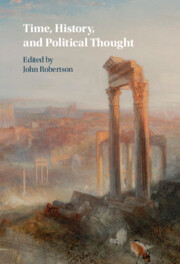Book contents
- Time, History, and Political Thought
- Time, History, and Political Thought
- Copyright page
- Contents
- Contributors
- Acknowledgements
- Note on References and the Bibliography
- Introduction: Time, History, and Political Thought
- 1 Out of Time? Eternity, Christology, and Justinianic Law
- 2 Historicity and Universality in Roman Law before 1600
- 3 ‘The Logic of Authority, and the Logic of Evidence’
- 4 Christian Time and the Commonwealth in Early Modern Political Thought
- 5 Politic History
- 6 Hobbes on the Theology and Politics of Time
- 7 The Recourse to Sacred History before the Enlightenment: Spinoza’s Theological–Political Treatise
- 8 Law, Chronology, and Scottish Conjectural History
- 9 Civilization and Perfectibility: Conflicting Views of the History of Humankind?
- 10 Kant on History, or Theodicy for Mortal Gods
- 11 Law’s Histories in Post-Napoleonic Germany
- 12 After Historicism: The Politics of Time and History in Twentieth-Century Germany
- 13 The Right to Rebel: History and Universality in the Political Thought of the Algerian Revolution
- Bibliography
- Index
8 - Law, Chronology, and Scottish Conjectural History
Published online by Cambridge University Press: 08 June 2023
- Time, History, and Political Thought
- Time, History, and Political Thought
- Copyright page
- Contents
- Contributors
- Acknowledgements
- Note on References and the Bibliography
- Introduction: Time, History, and Political Thought
- 1 Out of Time? Eternity, Christology, and Justinianic Law
- 2 Historicity and Universality in Roman Law before 1600
- 3 ‘The Logic of Authority, and the Logic of Evidence’
- 4 Christian Time and the Commonwealth in Early Modern Political Thought
- 5 Politic History
- 6 Hobbes on the Theology and Politics of Time
- 7 The Recourse to Sacred History before the Enlightenment: Spinoza’s Theological–Political Treatise
- 8 Law, Chronology, and Scottish Conjectural History
- 9 Civilization and Perfectibility: Conflicting Views of the History of Humankind?
- 10 Kant on History, or Theodicy for Mortal Gods
- 11 Law’s Histories in Post-Napoleonic Germany
- 12 After Historicism: The Politics of Time and History in Twentieth-Century Germany
- 13 The Right to Rebel: History and Universality in the Political Thought of the Algerian Revolution
- Bibliography
- Index
Summary
In the first of two chapters devoted to the ways in which philosophers of the Scottish Enlightenment used ‘conjectural’ or ‘stadial’ history to re-think the development of human society, Aaron Garrett examines the epistemic problems which stimulated their enquiries. Confronting questions in legal history which could not be answered on the principles of positive or natural law, the jurist Lord Kames had recourse first to human nature then to contextual historical developments (such as the rise of commerce) to enable him to bridge gaps in the evidence with empirical and explanatory ‘conjectures’. Kames further drew on Hume’s discussion of time as a psychological experience of a succession of ideas, which carried the implication that the times of history might be experienced in multiple forms. This implication is clarified by a comparison with the strictly chronological conception of time adopted by Adam Anderson in his history of commerce, which fitted every development of note into the same unitary Biblical time scheme. The point of stadial history, by contrast, was to compare societies at different levels, or ‘stages’, of development according to their own time schemes. By pluralising time, the Scots made it possible to envisage multiple histories of human origins, religious belief and social development.
Keywords
- Type
- Chapter
- Information
- Time, History, and Political Thought , pp. 179 - 193Publisher: Cambridge University PressPrint publication year: 2023



